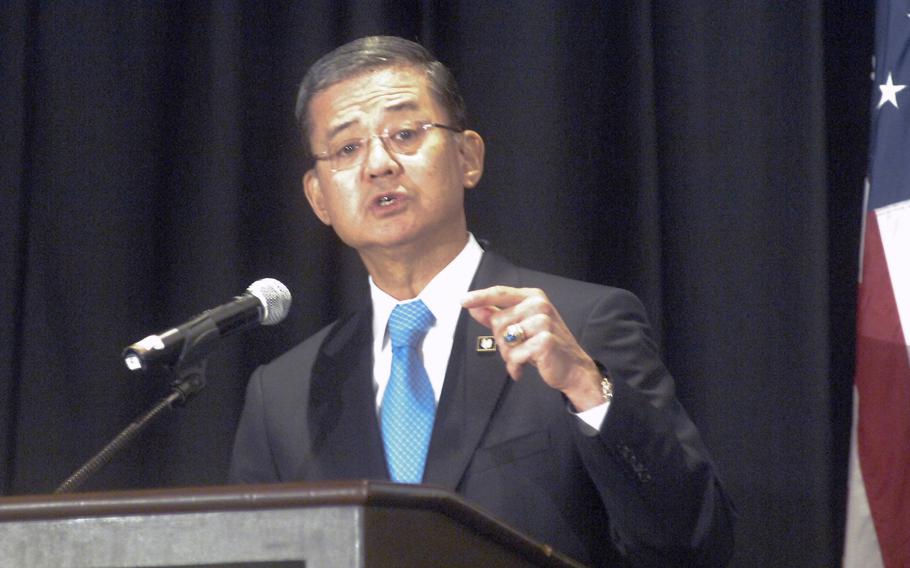Veterans
Search for new VA leader should look beyond ex-military, experts say
Stars and Stripes May 31, 2014

Veterans Affairs Secretary Eric Shinseki speaks at a veterans homelessness conference in Washington, D.C. on Friday, May 30, 2013. Roughly two hours later, his resignation was announced at the White House. (Carlos Bongioanni/Stars and Stripes)
President Barack Obama may want to look beyond the military community for someone with solid management experience to fix the Veterans Administration after retired Gen. Eric Shinseki resigned as head of the troubled department.
Shinseki, a decorated Vietnam veteran and former Army chief of staff, stepped down Friday after a preliminary investigation confirmed reports of widespread mismanagement and delays in scheduling appointments for veterans in VA hospitals.
TIMELINE | Shinseki at the topObama praised Shinseki but said the VA "needs new leadership" to address the mounting claims of malfeasance that allowed executives to cash in on bonuses even as veterans with serious health issues languished on secret waiting lists.
The search for that new leadership should be “less about having someone with a military background and more about someone with a management background,” said Michael Tanner, a senior fellow at the CATO Institute.
Tanner said many retired generals move from the Pentagon to the VA but "we’re not talking about combat or an army. We’re talking about bureaucracy.”
Tanner said veterans can identify with other veterans, but "they’re not dealing with the veterans, ultimately."
"They’re dealing with a lot of people who aren’t impressed by how many stars the guy wore,” he said, adding that a better candidate might be someone with solid business credentials, "ideally someone who's helped turn around a company."
Shinseki himself alluded to the problem just before his resignation was announced. In a speech to the National Coalition for Homeless Veterans, Shinseki said he had initially thought the delays in scheduling appointments for veterans were isolated cases.
Now, he thinks such delays are systemic and that he was misled by other managers within the VA system.
“I can’t explain the lack of integrity among some of the leaders of our health care facilities,” he said. “This is something I rarely encountered during 38 years in uniform.”
Phillip Carter, a former Army officer and current director of the military, veterans and society program at the Center for a New American Security, said Obama should “cast a wide net” as he searches for someone capable of repairing the damage.
“The next VA secretary should be familiar with the culture of the VA, but that does not mean that he or she needs to be a veteran, let alone a retired general or admiral,” Carter said.
With a department employing more than 312,000 people and a budget of more than $150 billion, any VA secretary must be “very politically astute… capable of balancing competing interests and priorities,” Carter said.
John Raughter, spokesman for the American Legion, said the key is to find a reformer, “someone who will make monumental changes to the structure of how the VA is operating now, someone who will hold the administrators accountable if they abuse their customers."
He also said the new secretary must change the "culture of fear" that seems to have kept many employees from reporting problems.
“It’s going to take a reform-minded individual,” Raughter said.
In a written statement, Iraq and Afghanistan Veterans of America urged Obama to choose a new secretary who would make “bold changes and work quickly and aggressively to change the VA system."
The organization also called on the president to look for a veteran of the wars in Iraq or Afghanistan.
Dr. Sam Foote, a retired VA doctor who helped expose scheduling abuses in the Phoenix VA, said someone with considerable administrative experience would be ideal, though a top-level hospital administrator would likely have to accept a significant pay cut to take the job.
Ex-military commanders would face culture shock, Foote said. They are accustomed to working with trained subordinates who follow orders — habits less widespread in the VA culture, Foote said.
“Superman would be good, if he’s available,” Foote said.
hlad.jennifer@stripes.com Twitter: @jhlad